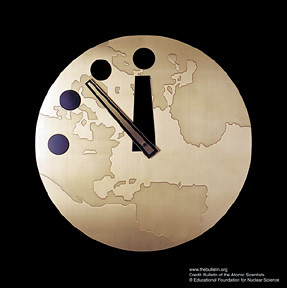
Here's what the Bulletin of the Atomic Scientists had to say about U.S. policy toward Korea last year:
The current administration's hope that North Korea will give up its nuclear weapons seems fanciful at this point. [11] What incentives could possibly persuade it to give up its weapons program, dismantle its nuclear complex, and agree to an intrusive verification regime? It seems highly unlikely that North Korea would agree to abandon the very thing that gives it leverage with its neighbors and the United States.Japan's new prime minister, Shinzo Abe, has already suggested redrafting his country's constitution to acknowledge and beef up its military might. We can expect, along with China's furious protests, that Abe will be re-thinking his options here.
President George W. Bush's first-term policies failed to move North Korea toward the goal of disarmament and instead proved to be counterproductive. Admonitions that North Korea is an "outpost of tyranny" and part of the "axis of evil" have tended to increase the North's already substantial fear and paranoia of the United States. The hardliners around Bush believe that isolation, pressure, and sanctions will cause North Korea to collapse and that it should not be rewarded for any positive steps it might take. The six-party talks, held in August 2003, February 2004, and June 2004, have yielded little. The United States proposed a step-by-step process for further talks, but North Korea recently rejected further negotiations...
A nuclear-armed North Korea could trigger an arms race in East Asia and beyond. This prospect has already prompted the United States to expand its nuclear targeting doctrine, enlarge missile defense programs, and plan the development of new nuclear weapons, such as the Robust Nuclear Earth Penetrator. A nuclear North could further harden the U.S. posture toward the country and reinvigorate extended nuclear deterrence strategies in the region. Worse, Japan might decide to build its own nuclear weapons program, which would surely provoke a Chinese response and in turn cause reverberations in India and Pakistan. There could also be repercussions in Taiwan and South Korea, both of which built fledgling nuclear weapons programs before U.S. pressure shut them down. Recent public disclosures of secret South Korean nuclear research do little to increase trust and allay fears.
This is a bad time to be saddled with a leadership whose idea of diplomacy is a gun to its neighbors' heads.





No comments:
Post a Comment